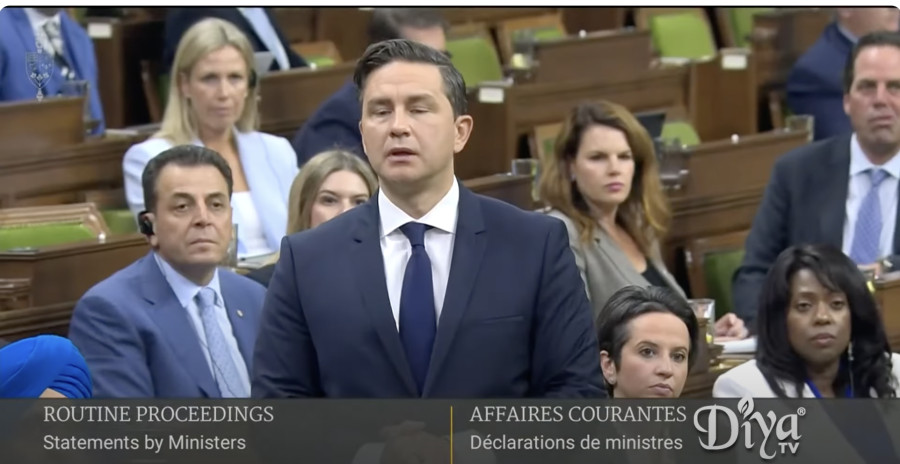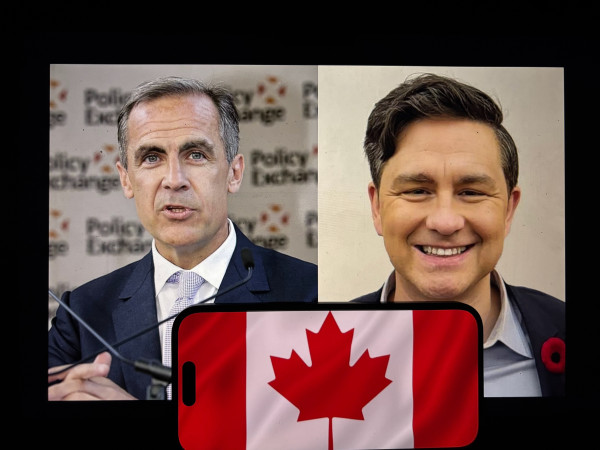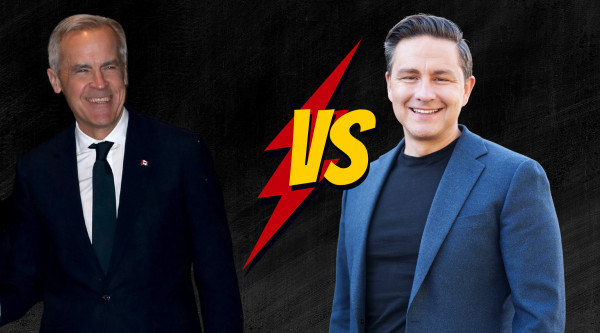Nijjar was a Sikh leader gunned down in Surrey, British Columbia earlier this summer. Instead of saying “Nijjar” he stumbled and said “nigger,” but then caught himself and autocorrected the error. No one in the House of Commons reacted, and Canadian television and print media ignored the gaffe altogether, but thanks to one Black reporter, Erica Ifill from The Hill Times, the slip of the tongue did not go unnoticed.
When I saw the clip, I thought it was quite ironic that in the shadows of Poilievre sat Leslyn Lewis, the (one of few) Black PC member of Parliament (MP) for Haldimand-Norfolk. Lewis might have heard the slip, but she did not flinch or say anything about the highest rank PC leader uttering a racial epithet in the House of Commons.
Her silence speaks to the mask Black MPs must undoubtedly wear as members of the PC party, which isn’t exactly known for embracing conversations about race.
On the other hand, the gaffe was said during a speech meant to honour someone who was tragically killed. Poilievre was appealing to the House Speaker and Canadians for swift investigation into his death, and that the Liberal Government, under Prime Minister Justin Trudeau, be more transparent about the investigation into the Indian government. How in the world would such a speech implicate Black people? It’s bizarre but it is also not something that should be ignored.
{https://www.youtube.com/watch?v=s6Bx9TWni3s}
Racial slips, gaffes, and misspeaks might seem trivial, a distraction from the “real issues” but when you consider the context for when such slip-ups occur, you begin to gain a deeper understanding of the kind of racial logic that is deeply embedded into every Western institution, especially politics.
A “slip of the tongue” is a mistake in speaking, usually trivial, sometimes amusing. However, as Columbia University linguistics professor John Hamilton McWhorter once explained in a 2011 article for The New Republic, “linguistic slip-ups tell us nothing at all. At other times, they tell us almost more than we’d like to know.”
In 2007, then-Republican presidential candidate Mitt Romney mixed up the names of Al Qaeda mastermind Osama bin Laden and then-Democratic presidential candidate Barack Obama. “The former Massachusetts governor was criticizing Democrats on foreign policy when he said, as reported in The Guardian, “Actually, just look at what Osam – Barack Obama – said just yesterday.” This gaffe marked the beginning of a right-wing movement that repeatedly accused Obama of being a Muslim, questioning everything from his citizenship to his qualifications to be president.
In their 2018 study in the British Journal of Social Psychology about speech errors, slips, and gaffes that are either explicitly racial, or more subtle and implicit, Rose Burford-Rice and Martha Augoustinos found that although slips and gaffes may be accepted or go unchallenged in private conversation, in the public domain, where both personal and institutional identities are at stake, addressing racial troubles-in-speaking may be delicate (and thus dispreferred), but ignoring or allowing such troubles to go unchallenged is not an option.
In other words, while the individual slip might not reflect a racist person, at the very least, the authors conclude, “they demonstrate shared discursive resources and practices of representation that continue to reflect and perpetuate racial inequality.” Of course Poilievre would utter the N-word and it go completely unchallenged in a House of Commons where there are notable disparities in racial representation.
According to a 2022 Policy Options report, using a population benchmark of about 25 percent and a citizenship benchmark of about 20 percent while Canadian parliamentary representation continues to improve, it remains at 15.7 percent, significantly below either benchmark. “Part of this reflects, of course, the 109 ridings with less than five percent visible minorities,” the report added.
The word is derived from the Latin word for the colour black, “niger.” No one knows precisely when or how it attained a pejorative meaning, but as Randall Kennedy examined in his controversial 2002 book, Nigger: The Strange Career of a Troublesome Word, we do know, however, that by the end of the first third of the nineteenth century, it had already become a familiar and influential insult. In the US, it is deeply embedded into practically every aspect of the culture, from literature to political debates, from cartoons to songs.
Over the last few years, many institutions such as universities have defended the use of the word under the veil of “freedom of speech” and “freedom of expression.” Such as in Fall 2020 when a letter written in French and entitled “Libertés surveillées” or “Monitored Freedoms” and signed by thirty-four University of Ottawa professors disagreed with how a white professor who used the word in their class had been treated, they argued that not using it in classes put academic freedom at risk.
I am a Black professor and I have never had the urge to use the N-word in my classroom, nor has my ability to “do my job” been impeded by not using the word.
Politicians like Poilievre can get away with his slip of the tongue for the same reason white professors think it an infringement on their rights to not utter a racial epithet used to harm Black people. In these majority-white spaces, which are also spaces where white bodies are not challenged or questioned (a privilege not afforded to Indigenous MPs such as Nunavut MP Mumilaaq Qaqqaq who quit politics in 2021, saying that every time she walked into the House of Commons, she was reminded that she did not belong there. “I always expect I'm going to be stopped by security,” she told CBC in an interview).
Should Canadians be outraged by Poilievre’s slip-up? Does he owe Black Canadians an apology? I honestly do not think it rises to that level. But it does shed light on the mentality of the PC leader and his casual approach to race and racial issues.
In fact, on September 30, just days after N-word “mistake”, on the National Day for Truth and Reconciliation Poilievre was called out online after posting images with an Inuk elder alongside a caption about meeting with Algonquin elders. Marc Miller, the former minister of Crown-Indigenous relations, responded to Poilievre's post by pointing out that the people in the images were not Algonquin, but rather Inuit.
My grandmother always used to say, where there’s smoke there’s fire. And when it comes to the PC Opposition Leader, there’s a whole lot of smoke around his racial missteps. There’s a pattern here that should not be swept under the rug as an “innocent” mistake. With every “Oops!... He Did It Again” we accept business as usual and diminish our voices as Canadians. And at this moment, we cannot afford to let even the most innocuous slip go unchallenged.

 By
By 





